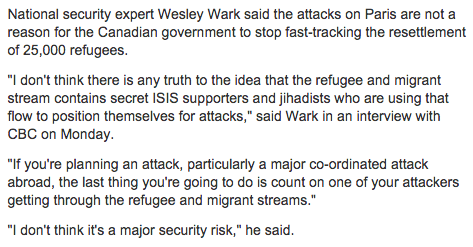Tell me all about my perspective.
And the article doesn't really coincide with my persepective that TCHC is perpetually underfunded and bursting at the seams but we still bring in more people. The article does refer to my statement that "I still haven't heard much about the overall plan". No one on this board is likely privy to the information that a citizenship judge is.
I'm utterly skeptical at the appeal to authority.
Authorities disagree with one another all the time, and it isn't because some of them are raving idiots, it's because reasonable people can disagree on the interpretation of evidence, and reasonable people can disagree on the relative weighting of different risks, etc. That
a (retired) citizenship judge expresses an opinion does not suggest that the expert opinion is what he has suggested. Am I to understand that if other experts disagree, you will simply say "Now I don't know what to think"?
As one example, this is the second instalment in a series of discussions about what we ought do about Syrian refugees. You did not cite the first, a policy expert from Ryerson and a director of an NGO on this matter. His position was, unsurprisingly, the opposite of the one you cited: that we should not let perfect be the enemy of good, we should resettle them quickly, and that in past similar cases the predicted worst-case scenarios about preparedness did not come to fruition. Why did you not cite this? Did you just discover that the CBC existed this morning? I recommend you check out Republic of Doyle and Murdoch Mysteries. Hard-hitting stuff.
As a result, I don't think you sincerely believe in the expertise you're citing. I think you're citing the expertise because you perceive that it lends credence to the argument, which incidentally is the same argument that you yourself made earlier, hair-splitting about the exact words used notwithstanding. My flip tone is largely because I'm assuming you're acting in bad faith.
On the matter of the substance of the judge's argument:
It is highly unlikely the judge would comment on these issues or any matter of policy like this were he an active judge. Therefore, although he is likely to have experience on the kinds of preparations that need to be made to resettle refugees or the nuances of immigration law (and certainly with the lived experience of being a refugee!), he is not likely to be privy on the exact plan going forward. I think it may well be the case that the "end of the year" deadline is unrealistic and the process will extend beyond that. I think in general when government of any party gives a deadline, I typically take it as a target and ask "is this even in the ballpark". I don't think resettling 25,000 additional people takes 20 years or 10 or even 5. Maybe it takes 6 months, maybe it takes 3. That's less clear to me. But I think the plan is within the realm of sanity. I do not think it is the case that the federal government plans to resettle a bunch of people knowing they are not prepared for it. This may seem like a just-so argument, "if the government is doing it, they must clearly believe they can do it", but so too is the judge's argument "if I haven't seen the plan, there mustn't be one".
Beyond that, there is no argument at all. It's simply a pull-quote. Which is fine.
I agree with the premise that part of bringing in refugees is affording them education, job training, job prospects, integration into a community (ideally through existing resources for new Canadians and/or Syrian communities in existing cities). I don't think you'll find anyone to disagree with that. No one simply thinks you can plunk people down and then brush the dirt off your shoulder. It's clearly an ongoing process.

